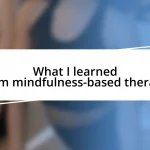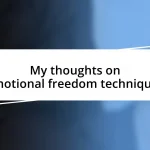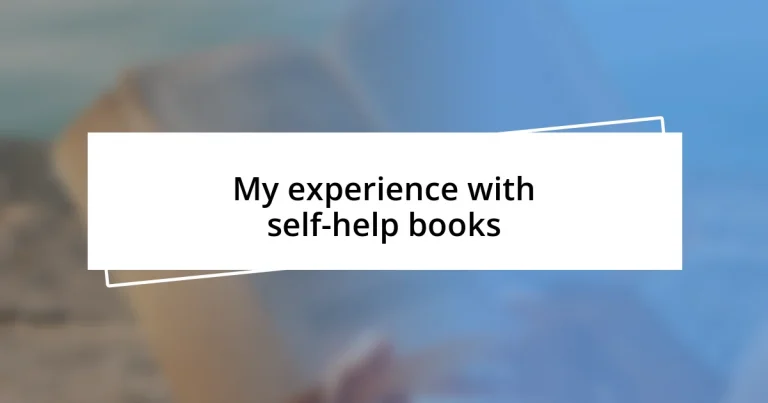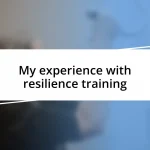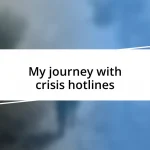Key takeaways:
- Self-help books promote self-reflection, enhance self-awareness, and provide practical tools for personal growth.
- Selecting the right self-help book involves tuning into emotional relevance, reading reviews, and trusting one’s instincts for a suitable match.
- Maintaining a dedicated journal for insights and sharing experiences fosters deeper understanding, accountability, and ongoing personal development.
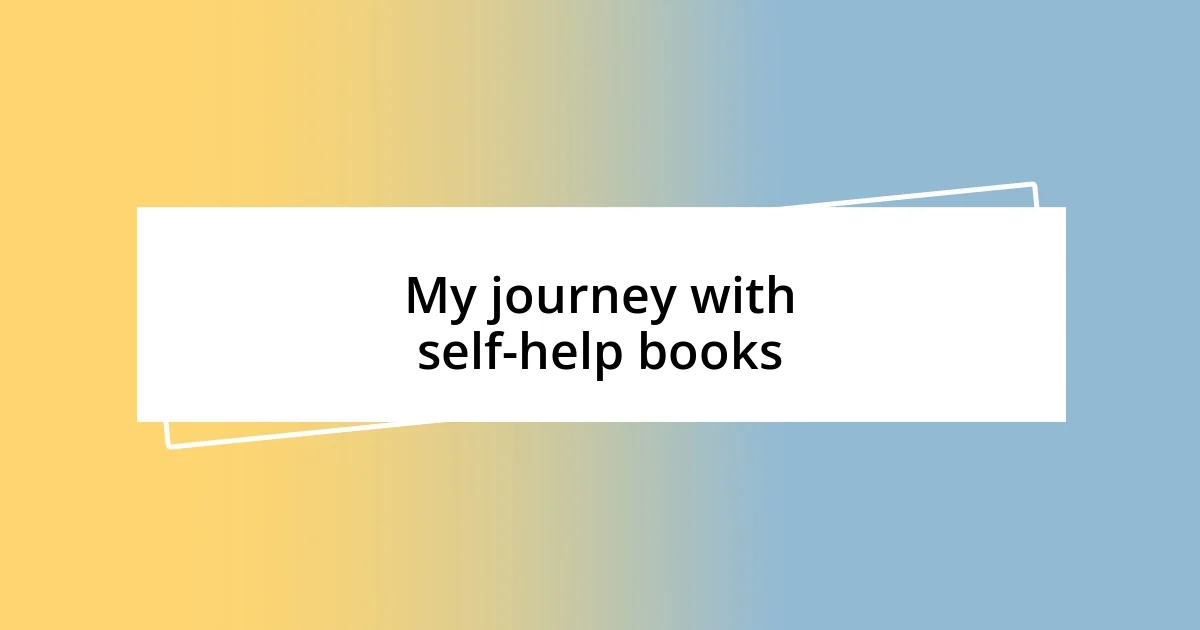
My journey with self-help books
When I first picked up a self-help book, I was at a crossroads in my life, feeling lost and unsure of where to turn. I still remember the cover of “The Power of Now” catching my eye in a small bookstore; something about it whispered to me, inviting me to explore new perspectives. Can you relate to that sense of urgency—like a book is calling out to you just when you need it?
As I delved into the pages, I experienced a rollercoaster of emotions. There were days I felt enlightened, inspired to make changes, but there were also moments of frustration when the words seemed to clash with my reality. Have you ever felt that tension between wanting to change and grappling with the familiar comfort of your current habits? I certainly have, and that struggle became a catalyst for growth.
Gradually, I began to see patterns and insights that resonated deeply with my own experiences. For example, one line about the importance of mindfulness led me to start journaling, something I had never considered before. That simple act transformed my day-to-day reflections and gave me clarity. It makes me wonder: what insights could your next read reveal to you?
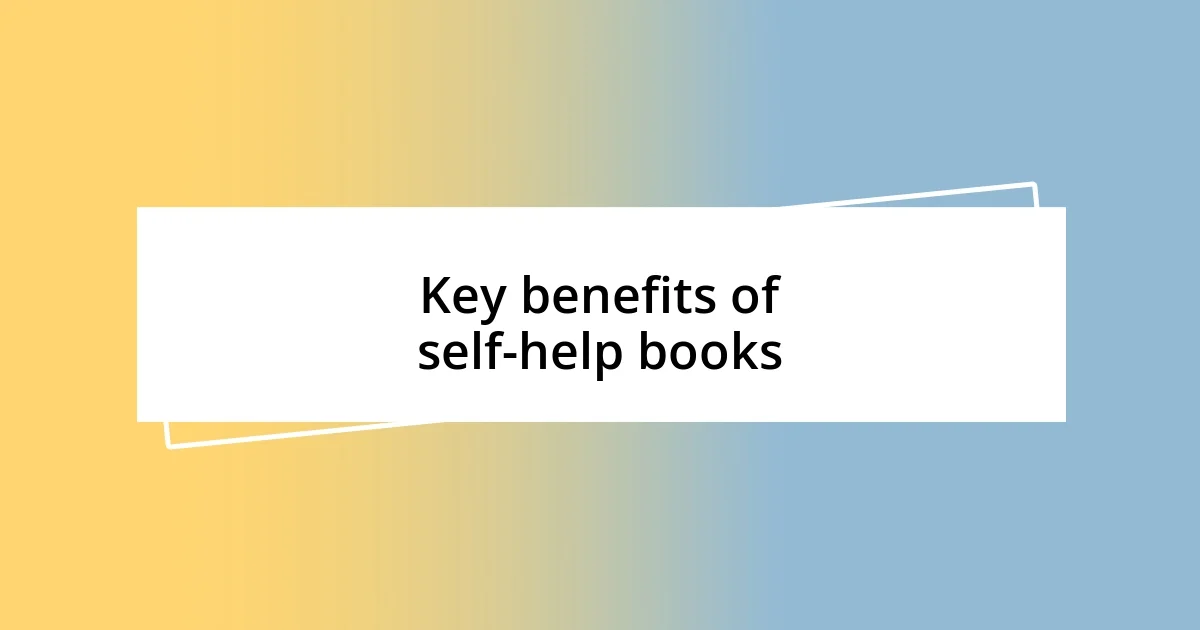
Key benefits of self-help books
Discovering the benefits of self-help books has been an eye-opening journey for me. One of the most significant aspects I’ve found is their ability to promote self-reflection. While reading, I often find myself diving deep into my thoughts and feelings, allowing me to gain new perspectives on my challenges and aspirations.
Here are some key benefits I’ve experienced:
- Enhanced Self-awareness: Self-help books prompt me to examine my beliefs and behaviors, fostering greater understanding of my motivations.
- Practical Tools: They often equip me with specific strategies to navigate real-life situations, making complex issues easier to tackle.
- Empowerment: I’ve felt a surge of confidence in making decisions as I internalize the principles shared by authors who have walked similar paths.
- Community Connection: Many books lead me to join discussions or online groups, creating a sense of belonging and shared understanding.
- Encouragement: They remind me that growth is a journey, not a destination, helping me embrace my progress and setbacks alike.
I recall once reading about gratitude practices, which inspired me to start a nightly gratitude ritual. It seemed simple at first, writing down three things I was thankful for each day, but the impact on my mindset was profound. Over time, this practice helped shift my focus from what I lacked to appreciating the abundance that was already in my life. Isn’t it fascinating how a few words on a page can transform the way we view our reality?
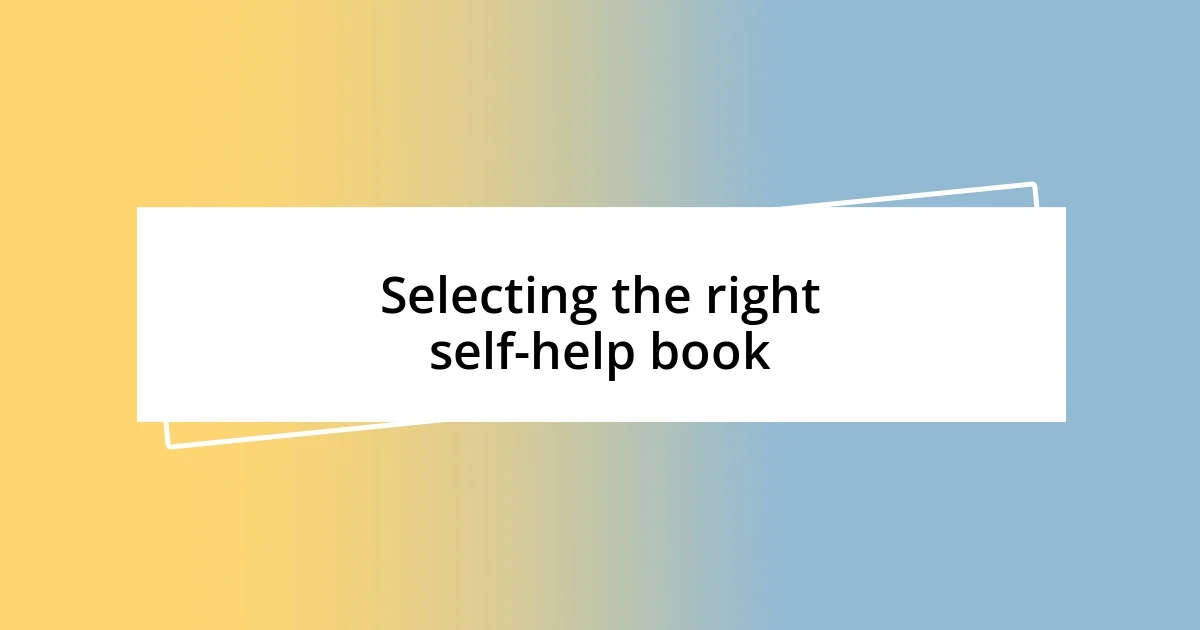
Selecting the right self-help book
Selecting the right self-help book can feel a bit overwhelming given the sea of options available. Reflecting on my own experience, I often start by tuning into my current emotional landscape. For instance, when I was grappling with anxiety, I found it most helpful to choose books that specifically addressed mental well-being. This not only guided my reading choices but also ensured that the material resonated with my struggles—like finding a familiar face in a crowd.
One tip I swear by is to read reviews or summaries before diving in. Knowing whether a book aligns with your personal development needs can save you time and help you feel more connected to the material. I recall grabbing a book purely based on its positive reviews, only to find it didn’t quite speak to my situation. That experience taught me the importance of aligning my reading with where I was at that moment.
Lastly, I’ve learned to trust my instincts when choosing a self-help book. Sometimes, a title just “clicks” with me—a feeling I can’t easily explain. Embracing that intuition has led me to discover remarkable insights that truly resonated. Have you ever picked a book based on that instinctive pull? It often feels like the universe is guiding you toward the right message.
| Criteria | Considerations |
|---|---|
| Emotional Relevance | Choose books that mirror your current feelings or challenges. |
| Reviews/Summaries | Look for insights to ensure the book aligns with your needs. |
| Intuition | Trust your gut feeling about a book’s potential impact. |
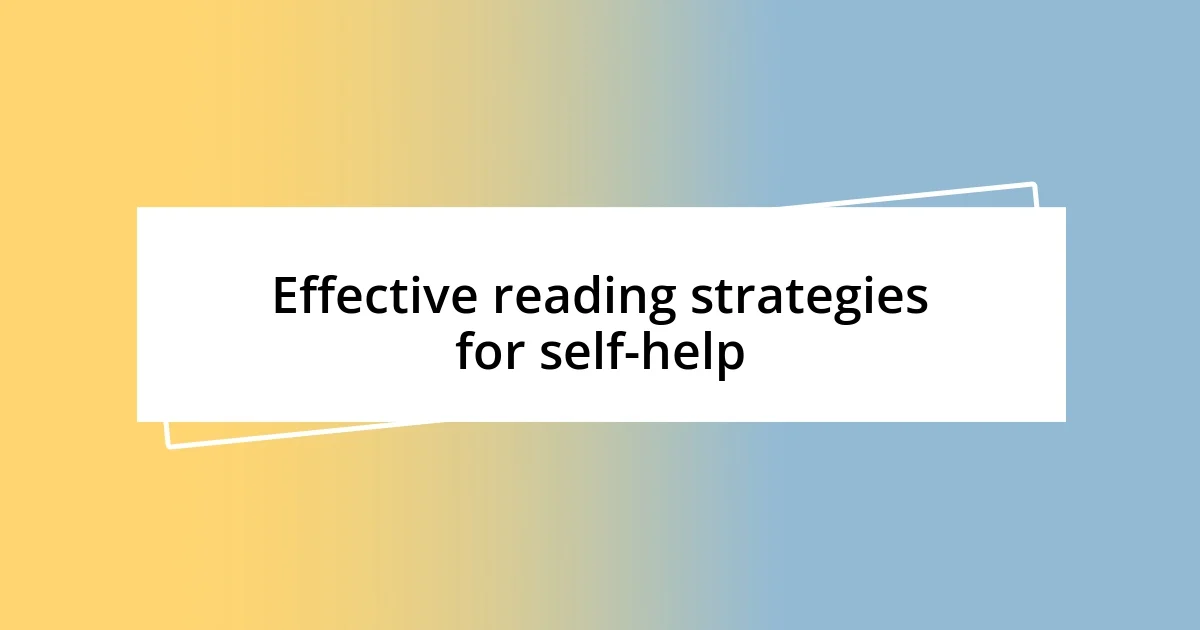
Effective reading strategies for self-help
When I dive into a self-help book, I treat it like a personal conversation. I often pause to reflect on what I’ve just read, jotting down thoughts or questions that arise. This simple strategy transforms passive reading into an active dialogue with the author. Was there a moment I felt a surge of recognition? Absolutely! I remember reading a chapter about overcoming fears and finding myself nodding along, thinking, “That’s exactly how I feel!” Engaging with the content in this way makes it so much more impactful.
Another approach I’ve found beneficial is to create a dedicated journal for my self-help journey. After finishing each book, I take some time to summarize key takeaways, along with how they relate to my own experiences. This not only reinforces the lessons learned but also provides a tangible record of my growth. Looking back, it’s rewarding to see how far I’ve come. Ever gone through your old notes and felt a mix of nostalgia and pride? It’s a testament to the journey of self-discovery.
Lastly, I like to share insights from my readings with friends or online communities. Discussing concepts enriches my understanding and offers fresh perspectives. I can recall discussing a book on emotional intelligence with a close friend—it turned into a profound conversation about our childhood experiences and how they shaped our current relationships. Have you thought about how sharing these insights could deepen your connections with others? It’s a beautiful way to not only learn but also bond over shared growth.
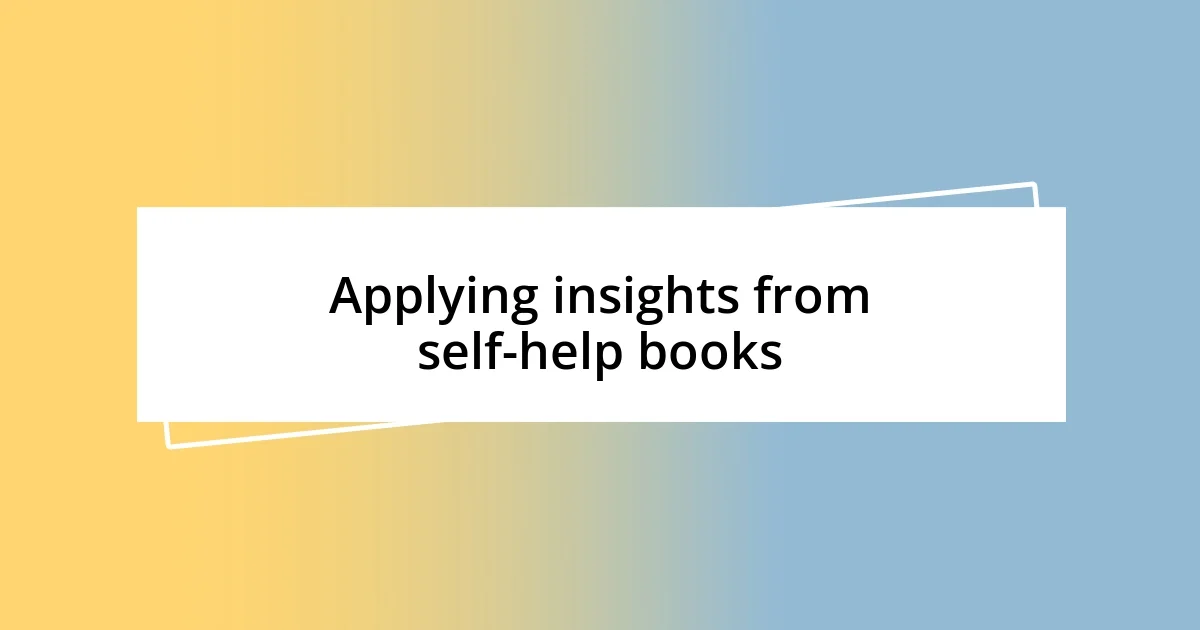
Applying insights from self-help books
Applying insights from self-help books involves a personal commitment to integrate what you’ve learned into your daily life. After reading a book on mindfulness, I decided to practice gratitude daily. Every morning, I write down three things I’m grateful for, even on tough days. This simple act of reflection has shifted my mindset remarkably—how often do we really pause to appreciate the little things?
I’ve also found it invaluable to set specific, actionable goals based on the insights I’ve gathered. For example, after absorbing a book about time management, I implemented a technique called the Pomodoro Technique, which involves working in focused bursts with breaks in between. The first week was a challenge, but over time, I began to notice a significant increase in my productivity. Have you ever tried a new approach and felt that instant spark of efficiency? It’s truly rewarding.
Lastly, I believe revisiting the insights periodically helps maintain that momentum. Every few months, I skim through my notes and reflect on how I’ve applied the principles. It’s intriguing to see not just what has stuck with me, but also how my perspectives have evolved. Have you taken the time to reassess what you’ve learned in your self-help journey? This ongoing reflection nurtures personal growth and keeps the knowledge fresh in my mind, making it easier to apply in new contexts.
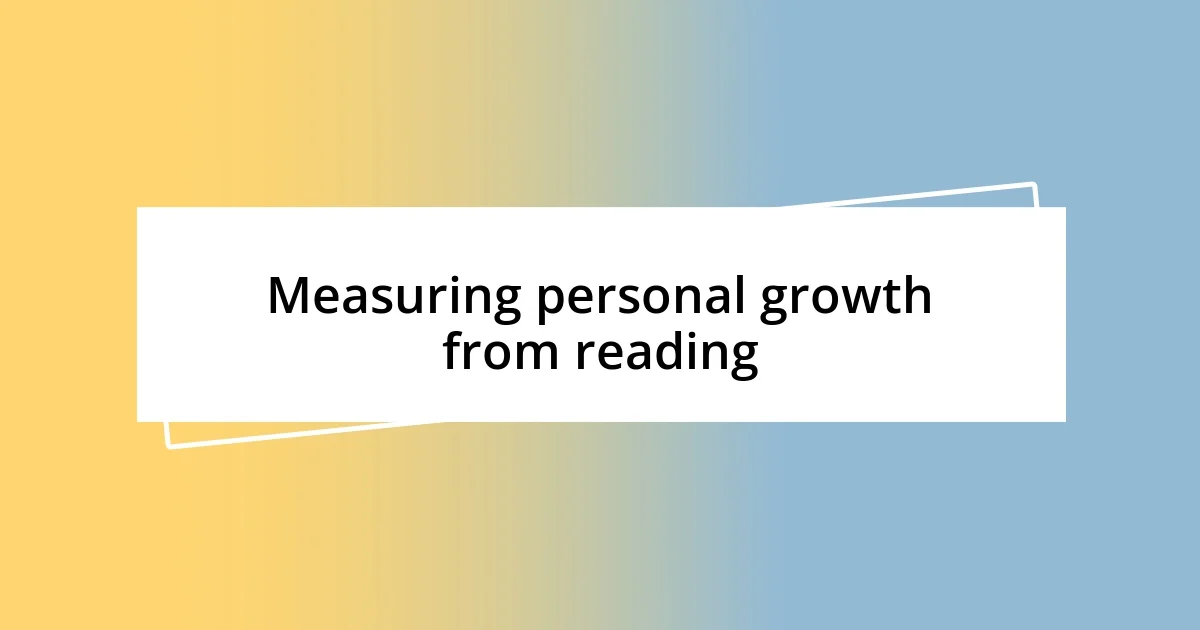
Measuring personal growth from reading
Measuring personal growth from reading can feel like navigating a winding path, filled with unexpected turns and milestones. I remember the first few self-help books I tackled; their messages overwhelmed me at times. However, as I slowly absorbed the ideas and reflected on my reactions, I began to notice subtle shifts in my thinking. Have you ever felt a book changing the way you see the world? For me, recognizing that I was no longer in the same mental space as before was a clear indication that growth was in motion.
Tracking my progress through self-help literature isn’t just about feeling different. I’ve started rating my comfort with various concepts from each book on a scale from one to ten. It’s fascinating to look back at earlier ratings and see how my understanding has expanded. For instance, after reading about vulnerability, I initially rated my comfort level a mere three. Fast forward a few months, and I realized I’d had deep conversations about personal challenges with friends—my comfort level had skyrocketed to a nine! This simple measurement tool has empowered me to understand my evolving emotional landscape.
Moreover, I believe interactions with the material help crystallize personal growth. Each time I share an insight from a book, I invite reflection and deeper understanding—not just for myself but also for those around me. I once shared a quote on resilience from a self-help book during a tough conversation with a coworker. That moment not only sparked a profound discussion but also helped me evaluate my growth in handling challenges. Have you ever noticed how discussing what you read can deepen your connection with others? Engaging with others about our personal development brings clarity to our own journeys and fosters a sense of community in our growth experiences.
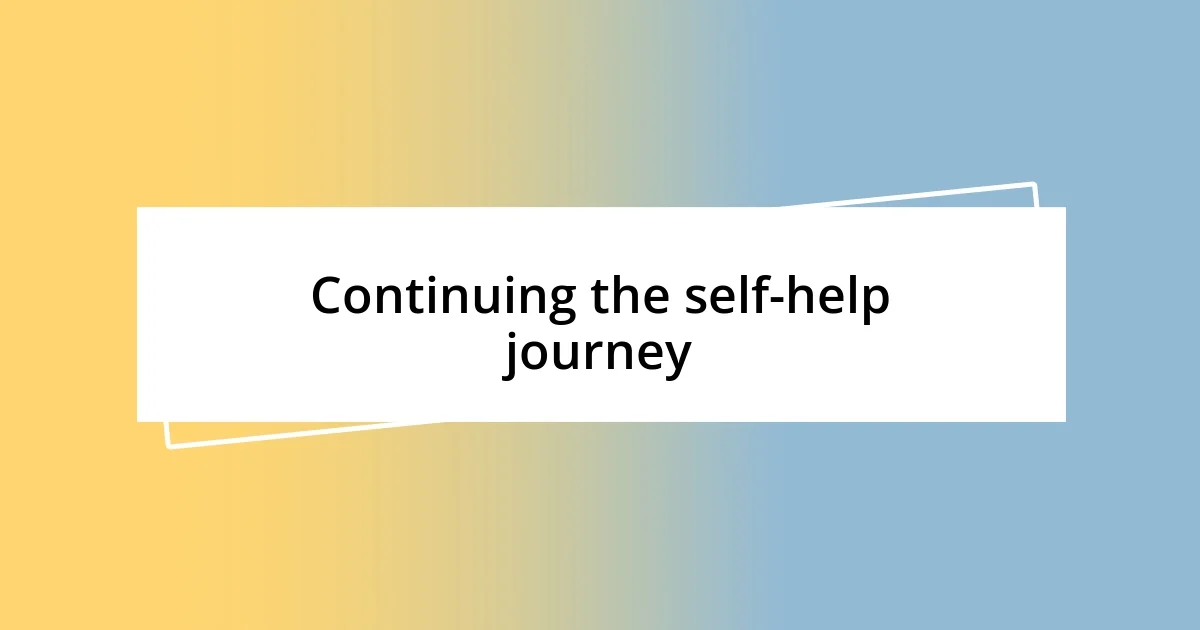
Continuing the self-help journey
Continuing the self-help journey is about embracing growth as a lifelong process. I vividly recall a moment when I stumbled upon a quote that resonated with me: “Life is like riding a bicycle; to keep your balance, you must keep moving.” It struck me that stagnation was the enemy of progress. So, I began to regularly revisit the self-help books that inspired me the most, allowing their teachings to serve as a compass for my ongoing journey. With each re-read, I uncovered insights I had missed before, as if the words were unfolding newer layers of meaning—have you ever had that experience of seeing something familiar in a fresh light?
As I delved deeper, I made it a point to engage with other readers too. Joining a book club wasn’t just an excuse to discuss books; it became a platform for exchanging ideas and experiences. Listening to others’ takeaways often sparked revelations within me. I remember when someone shared how a self-help technique had transformed their approach to conflict resolution. That story inspired me to try the same technique in a recent argument with a family member, leading to a meaningful dialogue rather than a heated debate. Isn’t it incredible how collective wisdom can enhance our individual journeys?
Lastly, I’ve found that documenting my experiences and breakthroughs has been a game changer. I started a journal where I not only summarize each book but also jot down how I applied the concepts in real-life situations. Looking back at those entries brings a sense of pride and accountability. Just the other day, I revisited an entry about setting boundaries, recalling how challenging that idea was for me initially. But now, I can confidently say that those boundaries have improved my relationships significantly. Does writing help you grasp your evolution in this journey too? It truly has been an enlightening tool for me, enabling me to understand my growth and shape my path moving forward.





